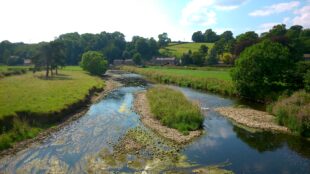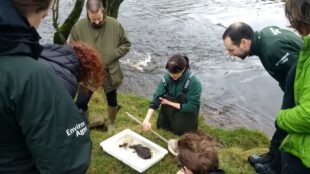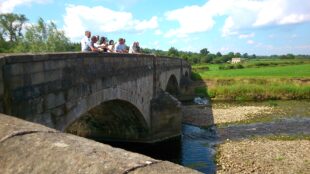The Environment Agency plays a key role in protecting water for people’s lives and livelihoods. There have been improvements in rivers and coastal waters over the last two decades, but more needs to be done and everyone has a role to play. The Environment Agency’s Land and Water team in Lancashire play a key role in helping protect and improve the catchments of the Rivers Ribble, Alt and Douglas.

Working in partnership to improve our rivers
The Environment Agency works in partnership with rivers trusts across Lancashire and Cumbria to deliver projects with multiple benefits, including: improving wildlife habitat, allowing rivers to function more naturally, reducing flood risk as well as improving water quality. Working in partnership helps us to deliver more for both people and the environment.
The biggest programme of works currently underway across the Ribble river catchment is the Ribble Life Together project being led by Ribble Rivers Trust. This will improve the water environment by the planting of 30 new woodlands, construction of 15 new wetlands and improvements of fish passage and habitat connectivity at 15 barriers.
There are multiple benefits from these works including improvements for biodiversity, reduced flood risk and improved water quality. The wider programme also provides educational work with schools and colleges, training opportunities include an apprenticeship scheme and improved access to the river environment by improving footpaths with a series of circular walks directing people to features of interest.
As part of the Ribble Life Partnership, we have plans to continue the good work, which include a suite of improvements to the river, including fish passage projects, river channel improvements and work with farmers. Most of this work is led by others with financial and technical support, however, we also hope to secure Water Environment Grant funding to deliver a further £1.5M of improvements.
We also support the Ribble Rivers Trust with the Tidal Ribble (and Wyre) Project where the main focus is on run-off from farmyards and fields with movements of cattle or those used for slurry spreading.
Agriculture is a significant source of serious pollution incidents, there are still far too many pollution incidents which damage the local environment, threaten wildlife and, in the worst cases, put the public at risk. Most farmers act responsibly and we work with them to respond to pollution incidents, tackle the root causes of pollution and promote good practice. But agriculture is a significant source of serious pollution incidents and all farmers have a duty to prevent them.
Last year the Environment agency and Defra brought in new farming rules for water – essentially taking what was best practice and make these the new rules – so farmers can take action to reduce the impact their farm has on rivers.
We know that improving and protecting the water environment is a huge task that not one organisation, business or community can be responsible for. We’ll keep our water cleanest by working in partnership together.

Improving water quality on the coast
Over the past two decades the Environment Agency has worked immensely hard to help beaches across the country to achieve high standards, including our beautiful beaches in the North West.
We are a key partner in the Turning Tides Partnership, which is focused on improving bathing waters and beaches, and enhancing their value to the local community and economy. As part of this, we put financial support into the LoveMyBeach initiative which gets local people out doing beach cleans and other voluntary activities as well as working with businesses to help them improve their environmental practices.
As a group we do everything we can to improve the quality of our bathing waters. Through infrastructure, planning, campaigning, volunteering, educating, engaging and hard work, our aim is to make sure everyone enjoys our beaches for generations to come.
The Partnership is looking towards 2025 and has set itself targets to focus on maintaining and further improving the water quality of our regional bathing waters, continuing the LoveMyBeach campaign to create cleaner, litter-free beaches and building a vision of the region’s coastline as a real asset for local communities and business and another reason to visit our fabulous north west region.
Practical projects include those to improve water quality of bathing waters on the Fylde Coast – Blackpool, St Annes and the like. Agricultural ‘interventions’ include; fencing and tree planting alongside watercourses to exclude livestock, diverting dirty water run-off from farm yards, roofing slurry stores to decrease the amount of slurry that needs to be spread to land, and helping farmers improve their soil structure to prevent run-off into watercourses. These projects are funded by a range of partners including United Utilities and Countryside Stewardship.
Tackling pollution incidents
Our staff respond to reports of pollution through our 24/7 incident hotline. When responding to incidents we look to stop and contain any pollution ultimately protecting water quality. We follow-up to investigate the source of pollution, stop the problem reoccurring and understand how best to reduce any impacts on local communities and the environment.
Over the course of the past year the number of serious and significant pollution incidents reduced to their lowest levels since 2011 but there are still far too many serious pollution incidents which damage the local environment, threaten wildlife and, in the worst cases, put the public at risk.
We will take tough action against any company or individual who causes significant pollution and damage to the environment. In November, United Utilities Water Limited was ordered to pay £232,000 to environmental charities as part of an Enforcement Undertaking with the money benefitting Mersey Rivers Trust (£90,000) and Community Forest Trust (£142,000) for discharging sewage into a brook. In 2015, Bloor Homes Limited paid £35,000 to Ribble Rivers Trust after it polluted Barrow Brook, a tributary of the River Ribble, whilst building houses at Pendle Hill View, Barrow.

What you can do
Everyone can do their bit to protect water quality – land managers farming responsibly, water companies investing in our water infrastructure and managing it well, all of us at home by being careful about what we pour and flush away.
Practical steps people can take:
- Blockages in the drains can cause sewers to back up and overflow onto streets or into streams, rivers and the sea. Help avoid blockages by only flushing the 3Ps – pee, poo and paper. Everything else e.g. wet wipes, sanitary products and cotton buds, goes in the bin.
- Cooking oils and fat can also cause drain blockages if poured down the sink as they set hard. Cool them first then put in the bin.
- Check your drains at home aren’t sending dirty water from toilets, showers and dishwashers into the wrong pipes and to rivers and the sea – go to www.connectright.org.uk
- At the beach please bag and bin your litter and dog’s mess and don’t feed the birds so they’re less likely to poo in the sea.
People on the ground are our eyes and ears so it’s important to remember to contact us if you notice pollution to land or water so we can investigate and take appropriate action to protect people and the environment. You can contact our hotline 24/7 on 0800 80 70 60.
I’m so proud to play a part in all the work to protect and improve the water environment in Lancashire. Knowing we’re doing a valuable job in helping protect and improve the fabulous environment we live in, now and in the future, certainly helps add a spring to my step in coming to work each morning.
.

5 comments
Comment by David Nicholas posted on
AS a person i am very concerned about the standard of water in the Lancashire area I do not think there is enough being done or information
sent out to people or companies on this matter.
Comment by Nathanial Swary posted on
Thanks for your comment David. As temporary inhabitants of this earth, we have to do everything we can to make sure we are<a href="https://shop.prmfiltration.com/collections/multi-jet-totalizing-water-meters">read water meter</a>to make sure there is enough for the next generation
Comment by Kory Archuletta posted on
We have to address this if we are to stay healthy as this is where our water comes from. We can't just hope that others will do the right thing--we have to take it upon ourselves because our future relies on the quality of the environment today and the quality of <a href="https://www.prmfiltration.com/remediation-equipment">environmental remediation equipment</a> we are willing to invest in to secure our future.
Comment by Mike Pusey posted on
The stream running through our garden is becoming increasingly polluted with grey appearance, foam, grey sludge and a smell of sewage. It is not a specific incident but might be worthy of investigation. The stream joins Colne Water about 500 metres downstream and will affect water quality there.
Comment by eileenroffe posted on
Hello, Please report this to our Incident team on 0800 80 70 60. They will ask more questions, log it and send to the area team. Eileen